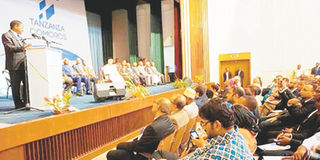TCCIA : People are central in Mtwara industrial growth

Former Minister for Foreign Affairs Bernad Membe adresses the Tanzania -Comoro business forum in Moron last year. Mtwara entrepreneurs on such forums to create markets and opportunities. PHOTO|FILE
What you need to know:
- Plans are afoot to make Mtwara Region the hub of petrochemical industries that will use natural gas as raw material. Chairman of Mtwara Chamber of Commerce, Industries and Agriculture Swallah Said Swallah explains to The Citizen what the chamber is doing to help entrepreneurs prepare to participate in the anticipated industrialisation. Excerpts:
Tanzania’s industrialisation strategy is going to receive a boost from natural gas extraction in the South-East regions.
Plans are afoot to make Mtwara Region the hub of petrochemical industries that will use natural gas as raw material. Chairman of Mtwara Chamber of Commerce, Industries and Agriculture Swallah Said Swallah explains to The Citizen what the chamber is doing to help entrepreneurs prepare to participate in the anticipated industrialisation. Excerpts:
QUESTION: How are Mtwara entrepreneurs prepared for the gas economy and eventual industrialisation?
ANSWER: Industrialisation is just starting in Mtwara. It will definitely take some years before the region becomes adequately industrialised. But we have already started preparing locally based businessmen and entrepreneurs, most of who are small and medium, to take advantage of the planned industrialisation and the gas economy in general. A lot of awareness and education has been provided in the last few years. And entrepreneurs have already started investing in various sectors in anticipation of inflows of large investments in gas exploration and petrochemical industries.
The hotel sector is the case in point. At least six new lodges and guest houses are being opened every month. We now have about four times new lodges and guest houses than we had a few years back. The regional market is now overwhelmed, incapable of hosting all the retail outlets that have been opened in the last two or three years. It is easy to overlook such issues but they show that not only is Mtwara’s economy growing but also entrepreneurs are responsive and read to take up opportunities for the anticipated petrochemical industries.
What is the role of TCCIA in Mtwara’s industrialisation?
We are trying to connect entrepreneurs with financial institutions and markets in order to bridge the financing gap and cater for increased production. We do this thruogh business forums some of which we convene ourselves. But we also particiapte in forums held by others.
These platforms are helpful because they bring together businessmen, entrepreneurs and representatives from financial institutions. There entrepreneurs get information on how to access financing, get to know that the conditions are.
The business forums are also platfforms where local entrepreneurs meet with large businesses and strike supply deals on, specifically, agricultural products.
Through the forums we have also linked Mtwara businessmen with their counterparts from neighbouring countries. For example we have already signed a Memorundum of Understanding with the Comoro Chamber of Commerce, which provides an opportunity for Comoro’s businesses to come to Mtwara to buy goods. In April 2015 about 10 Mtwara businessmen attended the Comoro-Tanzania business forum in Moron. The next forum will be, hopefully, held in Mtwara instead of Dar es Salaam. In the long run this will help increase Mtwara entrepreneurs’ income, exposure and put them in a good place to benefit from the gas economy.
We are working with some institutions to help improve production chains and value addition as well as market systems. We plan to implement a five year plan called Tanzania Local Enterprise Development. This will be funded by the government of Canada and will be implemented by VSO. The aim is to reach at least 2500 small and medium entrepreneurs in Mtwara and in other regions such as Iringa, Lindi and Mwanza in the first year.
But we in Mtwara target 600 beneficiaries in the first year. We will work with VSO and Sido. We are in talks with another organisation called MEDA for a six years project to assist small entrepreneurs to increase quality of their products. The project is called Strengthening Small Business Value Chain. This project will also be sponsored by the Canadian government. All these projects aim at building the capacity of the private sector in Mtwara, but also uplifting small and medium entrepreneurs who consist much of the private sector to be able to participate in the gas economy.
Has TCCIA membership increased?
Our membership has increased from 530 three years ago to 746 currently. We atribute this to the awareness campaigns and the services we have been providing. But there is room for growth because Mtwara has about 100,000 entrepreneurs. We hope the Regional and District Business Councils that we have created will attract them into joining business organsiations. These councils bring together members from the public and private sectors for fruitful and candid discussions on various issues affecting the economy. The Mtwara Regional Commissioner has been very helpful in this, and we hope more entrepreneurs will join.
Does your services reach entrepreneurs who are not members?
Of course. We have been working with Brela, for example, to help register Mtwara businesses. In the last two years more than 300 businesses have been registered through TCCIA Mtwara. Formerly we helped them to fill the forms and we sent them to Brela headquarters in Dar es Salaam. Even when online business registration became possible since last year we still use our e-business centre to help entrepreneurs register their business.
It is easier and takes little time. But we also impart business education and computer skills to entrepreneurs. We have a package that helps entrepreneurs store their financial records online. The genera aim is to help them use Information Technologies to improve their business practices.
Mtwara now has more banks than any other Tanzanian town of its size. Has this offered any relief in terms of access to financing?
It is true we now have about nine banks. We used to have the Postal Bank, NBC, NMB, Exim Bank. But now other banks have opened shop. They include Diamond Trust Bank, CBA, BOA, Ecobank and the People’s Bank of Zanzibar. The Bank of Tanzania is now building the largest branch outside Dar es Salaam and Zanzibar. We have seen at least five banks opening branches in two years. Reasons are clear! And we expected this expansion of financial services. I do not have current statistics but the circulation of money in Mtwara has increased two-folds in the last five years.
Mtwara town’s population has increased. The purchasing power has increased owing to the influx of expats and increased high paying jobs in various new investments. Though thee competition among the banks has increased access to finance by Mtwara entrepreneurs it has not, however translated into the reduction of interest rates which still ranges between 24 and 30 per cent depending on the size of the loan and the repayment schedule.
But it has increased access to financing in the sense that many banks have reduced lending conditions and issue loans quicker. In the past processing a loan could take up to six months. Many banks now do not require collateral from small entrepreneurs. What entrepreneurs need to do is to organize themselves in groups and so they are given loans as groups. But they repay as individuals.
Are you satisfied with the capacity of the infrastructure in Mtwara as far as enabling ndustrialisation?
The current infrastructure is still inadequate to handle big industries. But we are satisfied with plans to expand and improve various infrastructure projects to handle industrialisation.
And I know about this because I attend various government meetings that plan and discuss about these plans. In fact the implementation of most of the projects has already started. In electricity, for example, there are efforts to increase supply.
We now have 18MW locally produced. It is enough for current uses but we know it is not enough for industries. In fact that amount is not even enough for Dangote alone. I am not the spokesperson of the government but I know that there are plans to build a 600MW power plant. This will be enough to feed several large industries. I am aware construction of the plant starts this year.
There are also plans to build a water pipeline from River Ruvuma to Mtwara town. This pipeline will bring about 100,000 cubic metres more than Mtwara’s daily needs. Without industries that can take up all this water it will be wastage of resources. There is also urban planning project underway which will map areas for various activities.




